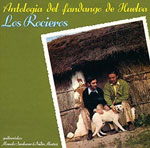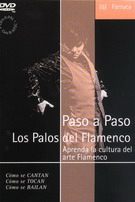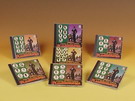A Falseta is part of a Flamenco song, much as a sentence is part of a paragraph. The artists improvise their own falsetas which are then put together to form the whole song. Most Flamenco forms have strongly defined rhythmic patterns.
Falseta
Fandango
Fandango is a lively folk and flamenco couple-dance usually in triple metre, traditionally accompanied by guitars and castanets or hand-clapping (palmas in Spanish). Fandango can both be sung and danced. The sung fandango is usually bipartite: it has an instrumental introduction followed by "variaciones". Sung fandango usually follows the structure of "cante" that consist of four or five octosyllabic verses (coplas) or musical phrases (tercios). Occasionally the first copla is repeated...
The metre of fandango is similar to that of the bolero and seguidilla. It was originally notated in 6/8 time, but later in 3/8 or 3/4.
Fandangos de Huelva
Fandangos de Lucena
Folk song from Cordoba, city of Lucena, typical for the Fandangos styles.
Fandanguillo
An eastern folk song, belonging to the fandango style, well known all over Andalusia. Folk songs more alongated in its pronunciation, more folkloric, with more style. Danced in the region of Andalusia, sometimes accompied by orchestra like the pasodobles.
Farruca
Farruca is a form of Flamenco music, probably originating in the Galicia region of north-western Spain. It is a light form typical of cante chico, and is traditionally danced only by men. It is seldom sung.
The farruca is commonly played in the key of A minor, with each compás equivalent to 2 measures of 4/4 time with emphasis on the 1st, 3rd, 5th, and 7th beats: [1] 2 [3] 4 [5] 6 [7] 8
Nobody has ever proven in any way that the Farruca came from Galicia. The earliest Farruca recordings are actually villancicos (Christmas songs) lyrics. There is only a very brief mention of Galicia by La Niña de los Peines. The name Farruca is etimological more connected to the Arabic language, in which the first name Faruk and the last name al-Farruqui are very common. Also the Farruca is very close to the Zambra in rhythm and flavor.
Flamenco
Flamenco is a Spanish musical genre with origins in Andalusia and a term that refers both to a musical genre, known for its intricate rapid passages, and a dance genre characterized by its audible footwork. The origins of the term are unclear. The word Flamenco, which applies to the song, the dance and the guitar, did not come into use until the 19th century.
Flamenco embodies a complex musical and cultural tradition. Although considered part of the culture of Spain, flamenco actually originates from one of Spain's regions: Andalusia. However, other areas, mainly Extremadura and Murcia, have contributed to the development of several flamenco musical forms, and a great number of renowned flamenco artists have been born in other territories of the country. It is generally acknowledged that flamenco grew out of the unique interplay of native Arabic, Andalusian, Sephardic, and Gypsy cultures that existed in Andalusia prior to and after the Reconquest. Latin American and especially Cuban influences have also been important in shaping the rumba flamenco form. Flamenco is the music of the gypsies and played in their social community. Andalusian people who grew up around gypsies and the life were also accepted as "flamencos" (Paco de Lucía).
Flamenco Opera
Flamenco show: singing, dancing and guitar. Very common between 1920 and 1936 around Spain. Generally performed in bullfighting squares and huge theaters.
Flamenco Scene (Cuadro flamenco)
A group of dancing performers, singing and flamenco "toque".
Flamencología, Flamencology
Flamencology, from the Spanish word Flamencología, is an academic discipline pertaining to the Flamenco arts. It combines research, documentation, and other techniques to achieve the diffusion and preservation of the art. First use in 1955.








